- Home
- Sue Grafton
U is for Undertow Page 11
U is for Undertow Read online
Page 11
Restless, he got up and carried his drink with him as he crossed the grass. He strolled the perimeter of the yard, looking out over the wood-rail fence. In the distance, he could see the fairway for the fifth hole at the country club he and Carolyn had joined shortly after moving to town. The membership fees were steep—eighty thousand bucks up front and five hundred a month in dues thereafter. They also got assessed for any capital improvements. Not that he objected. He’d taken a secret pride in their acceptance, given the fact that his own parents had been turned down when they applied years before. Walker was coming up in the world.
He turned to look back at the house, which was all charm, Cape Cod style, with white clapboard siding and a steeply pitched roof. The large central chimney was linked to fireplaces in two rooms, upstairs and down. Carolyn had insisted on an extensive remodel before the kids came along.
There was more time for construction than either of them anticipated. Carolyn had no problem getting pregnant, but she miscarried four times and lost another baby at sixteen weeks. Faced with the prohibitive expense of additional infertility treatments after five failed intrauterine inseminations, they’d elected to adopt. Carolyn took charge of the process and powered everything through—background check, fingerprinting, a lengthy application with attendant paperwork, letters of recommendation, followed by home visits that included separate and joint interviews. It took three months to be approved and they expected to wait for a year before a baby came through. Fletcher, the wonder boy, dropped in their laps six weeks later when his intended adoptive mother learned she was pregnant with twins.
When Fletcher was two, Carolyn went back into high gear. The process was simpler that time since many of the same approvals were in place. Linnie came to them by way of a local adoption attorney who’d been chatting with Carolyn at a Christmas party. The bio-mom, unmarried and eight and a half months pregnant, had come into his office the week before. The baby’s father refused to marry her, she’d lost her job, and her parents had kicked her out of the house. Would the McNallys be interested? There was no discussion at all. The birth mom moved into the McNally’s guest room for the final weeks before the birth. Carolyn and Walker were both present in the delivery room when Linnie was born.
When his second drink was gone, he went back to the kitchen and fixed himself a short one. His tension had dimmed and the knot of anxiety in his gut was all but gone. He noticed that eight months of good behavior had boosted the effects of the booze. He loved the sensation. He couldn’t help himself. Alcohol gave him access to his feelings. He experienced an extraordinary appreciation of his wife, his children, and the life he lived. Ordinarily, he held his emotions in check. He lived in a state of detachment, a stance he’d developed years before as a matter of self-preservation. He was present in his head but his sentimental side was seldom given free rein. It was in quiet moments like these that he let down his guard.
Walker still teared up on occasion watching his two little ones who resembled Carolyn closely enough to be mistaken for her “real” kids instead of the miraculous blessings they were. Where his love for his wife was constant, his devotion to his children overrode everything. Through them he’d been made vulnerable. His heart had opened to them in wholly unexpected ways. He’d been surprised by the depth and tenderness of his feelings because his soft side was in evidence nowhere else. The loss of either child would be a blow he could never recover from. His only prayer, on the rare occasions when he prayed, was that Fletcher and Linnie would be protected from evil and violence, spared illness and injury, disease and death. No one knew better than he did how fragile life was.
At 7:00 he called in an order for a large pizza with onions, jalapeños, and anchovies, a combination that would have made Carolyn shudder. The guy on the phone said it would be thirty minutes, which was fine with him. He changed into sweats and slippers and then went into the den where he unfolded a TV tray and set it with a paper napkin, a dinner plate, and silverware. When the pizza arrived, he’d make himself a proper drink that he’d nurse while he ate. He pictured an early evening, maybe reading in bed before he turned out the light. All he had to do was hang tight and act like everything was fine.
10
Friday, April 8, 1988
I skipped my run the next morning and went into the office early. I knew a three-mile jog would wipe out the lingering sense of melancholy I felt, but sometimes when you’re down in the dark, you lose the will to come up. The mood would pass as the day wore on. In some ways, I was sorry I’d seen the black-and-white photograph of Mary Claire. In that brief glimpse, I’d seen the mischief in her face and the light in her eyes. Before that moment, she’d been little more than a concept, Mary Claire Fitzhugh who’d vanished from the face of the earth. Now her life had touched mine and her fate had left a mark as delicate and distinct as a fingerprint.
I made a note in Michael Sutton’s file and stuck it in the drawer, then went back to the rough draft of the report I’d begun writing two days before. I revised and polished and typed it into final form. I began work on the second report, knowing I’d have to take two or three runs at it. This part of the business always felt like high school to me, as if I had a term paper due and my final grade depended on it. I suffered so much performance anxiety at Santa Teresa High, it just about shut me down. Once Ben Byrd and Morley Shine had trained me and I was out on my own, I understood that the whole point of a client report was clarity, laying out the sequence of events in an orderly fashion with sufficient detail that a stranger reading the file years later could follow the course of an investigation. That, I could do. I’d even learned to enjoy the process, though it didn’t come easily.
I paid my bills and made the bank run, depositing a collection of miscellaneous checks that had accumulated during the week, plus the five hundred dollars Sutton had paid me, which I’d removed from my office safe. While I was out, I picked up a sandwich and chips at the deli near the bank. The sandwich was a wicked one that I allowed myself once a year: a thick layer of liverwurst, with mayonnaise and thinly sliced dill pickle on freshly baked sourdough. While I would never dream of slapping a big glistening liver between two slices of bread, liverwurst was close to heaven, the poor man’s pâté. I know organ meats play hell with my cholesterol levels, but I doubted the occasional indulgence would prove fatal. I was in the habit of eating so fast, maybe nothing would adhere. Halfway through the sandwich, I heard the outer office door open and close. I slid the sandwich, waxed paper and all, into my pencil drawer and wiped my mouth in haste.
When I looked up, Diana Alvarez was standing at my door. She wore a snug black turtleneck and a short preppy-looking pleated skirt over black tights. Her low-heeled patent-leather shoes had little brass buckles across the tops that were ever so pert. Her hair was pulled back in a ponytail, a style that magnified her dark brown eyes behind rimless glasses.
She said, “Mind if I sit down?”
“Be my guest.”
As she settled in the chair, she straightened her skirt under her to avoid wrinkling the fabric. Over one shoulder she had a small bag on a thin leather strap. I’m constitutionally incapable of toting anything that small. Hers probably contained her driver’s license, a tube of lipstick, her mad money, one credit card, and her little spiral-bound notebook with a pen stuck through the wire loops. I was hoping she had a tissue tucked in there somewhere for nasal emergencies.
“What’s on your mind?” I anticipated a few follow-up questions about the dig the day before. Maybe she’d apologize for being pushy and deceptive, traits I found attractive in myself but unappealing in her.
“We need to talk about Michael Sutton,” she said.
I went through an automatic sorting process, wondering:1. How and what she knew about Michael Sutton;
2. Whether she was fishing to confirm my professional relationship with him; and
3. Whether I was still bound by ethical constraints now that our one-day business dealings had come to an end. What, if
anything, was I at liberty to disclose?
“Where did that name come from?”
“Cheney Phillips told me he talked to Michael at the station and then referred him to you. I spotted Michael at the dig yesterday, and since you were at the scene as well, I’m assuming he hired you. Is that correct?” Even without her spiral notebook at hand, she was confirming the facts.
“Why not ask him?”
“I don’t want to talk to him.”
“Too bad. I don’t intend to conduct a conversation behind his back so there you have it.”
“We don’t have to behave like antagonists. I’m here to save you a few headaches …”
I opened my mouth to interrupt and she held up one hand.
“Just listen to me,” she said. “I didn’t realize what was going on until I saw his MG parked by the side of the road. I’d been sent to cover the story, so I waited like everyone else to see what they’d find. I assumed the police were operating on an anonymous tip and then it dawned on me Michael was involved.”
“That still doesn’t tell me why you’re here.”
She cocked her head and the light glinting off her glasses was like a quick camera flash. “I’m his sister, Dee.”
Ah. Dee, the difficult one. I looked at her closely, seeing for the first time Sutton’s solemn brown eyes staring back at me. “Alvarez is your married name.”
“I’m divorced. Pete’s my ex.”
“Peter Alvarez, the radio talk-show host?”
“The very one,” she said. “I take it Michael mentioned me.”
“Briefly. He told me you were estranged.”
“Did he tell you why?”
“No, and I didn’t ask.”
“Shall I fill you in?”
“To what end?”
“I think you should know what you’re dealing with.”
“Thanks, but no thanks. A conversation about him is inappropriate.”
“Hear me out. Please.”
I debated with myself. Technically, I was no longer in his employ and nothing she said would have any bearing on the job he’d hired me to do. I couldn’t imagine where she was headed and I confess my curiosity got the better of me. “Keep it short,” I said, as though a brief airing of the dirty laundry would be less objectionable.
“I’ll have to backtrack first.”
“No doubt,” I said. Long-winded storytelling must have been a family trait. Michael had done the same thing, making sure the facts were arranged in date order. I could see her composing sentences in her head.
“Michael’s been depressed all his life. As a child, he was always anxious, subject to all manner of imaginary illnesses. He did poorly at Climp and barely managed to graduate. He couldn’t find a job and since he had no income, he asked Mom and Dad if he could go on living at home. My parents agreed on one condition: he had to get help. If he’d find a therapist, they’d pay for it.”
I was getting restless. Unless Michael Sutton was a spree killer, I didn’t care about his psychiatric history.
She must have caught my impatience because she said, “Bear with me.”
“It would help if you’d get to the point.”
“Are you going to listen to me or not?”
She fixed me with a stony stare and I could barely keep from rolling my eyes. I gestured for her to continue, but I felt like an attorney questioning the relevance of her testimony.
“The family doctor referred him to a licensed marriage and family counselor, a psychologist named Marty Osborne. Does her name ring a bell?”
“Nope.” I could tell she was teasing out the narrative for dramatic effect and it annoyed me no end.
“Michael seemed to like her and we were all relieved. After he’d been seeing her for a couple of months she suggested his depression was symptomatic of early childhood sexual abuse.”
“Sexual abuse?”
“She said it was just an educated guess, but she felt they should explore the possibility. He didn’t believe a word of it, but she assured him it was natural to block trauma of that magnitude. We didn’t know any of this at the time. It all came out later.”
“Shit.”
“Shit is right.” Diana shook her head. “Marty continued to work with him and, little by little, the ugly ‘truth’ came out. She was using hypnosis and guided imagery to help him recover his ‘repressed’ memories, sometimes with the aid of sodium amytal.”
“Truth serum.”
“That’s correct. Next thing we knew, she’d diagnosed him with multiple personality disorder. As luck would have it—now here’s a happy coincidence—she ran an MPD support group, which Michael joined. More cash changed hands, his to hers. Meanwhile, my parents were blissfully unaware of what was happening. My brothers and I were out of the house by then so we saw much less of him than they did. After three months, Michael started seeing her twice a week and talking to her on the phone three and four times a day. He didn’t eat. He scarcely slept. We could see that, psychologically, he was disintegrating, coming apart at the seams, but we thought his getting worse was part of the process of getting better. Little did we know. She persuaded him it would be ‘healing’ if he confronted the past, which he did with a vengeance. He accused my father of molesting him from the time he was eight months old. He had these shadowy memories that he knew were real. Soon, his hazy mental movie came into focus and he ‘remembered’ my mother was also in on the abuse. Next thing you know, my younger brother Ryan was added to the list. We’re talking nasty stuff—claims of satanic ritual, bestiality, animal sacrifice, you name it.”
“Sounds preposterous.”
“Of course. What made it worse was my parents had no way to defend themselves. Any attempt they made to refute his claims only served to reinforce his conviction that they were guilty as charged. Marty told him abusers always deny what they’ve done. He moved out of the house, cutting off all contact, which was actually a relief. Then she talked him into collaborating on a book and that’s what blew the lid off.
“When Mom and Dad got wind of it, they hired an attorney and sued the crap out of her for slander and defamation. The night before they were set to go to trial, they reached a settlement. I don’t know the terms because they signed a confidentiality agreement. Whatever it was, my parents were never able to collect a cent. Marty filed for bankruptcy and that’s the last anybody ever heard from her. For all we know, she’s still in private practice only somewhere else.”
“I don’t get it. Why would she do such a thing?”
“Because she could. She saw it as part of her job. In her eyes, she did no wrong. When they took her pretrial deposition, do you know what she said? That even if his story wasn’t true, she was there to validate his feelings. If he was convinced he was abused as a child, then she would support him in his beliefs. In other words, if you think you were abused, you were, and that’s all it takes.”
“Without proof?”
“She didn’t need proof. She said if that was ‘his truth,’ he could depend on her to keep the faith.”
“Did the family doctor who referred him know what she was up to?”
“In his deposition he admitted he’d never met her. She’d been recommended by another doctor whose opinion he respected. In a way, it was beside the point. You don’t need a doctor’s referral to see a therapist. Just look in the yellow pages and pick anyone you like. Some of them even have little boxes advertising their specialties. Self-esteem issues, crisis counseling, anger management, stress, panic attacks. The list goes on and on. Who among us hasn’t experienced the occasional rage or anxiety?”
“How do you know which therapists are legitimate?”
“I have no idea. I’ve never been in therapy. I’m sure most of them are honest and capable. Some might even be skilled, but sexual abuse is like a siren call. There’s a ton of money to be made.”
“That’s a bit cynical, isn’t it?”
“Not as cynical as you might think. Suppose you go into thera
py because your relationships aren’t working out the way you’d hoped. Turns out that’s a symptom of early childhood abuse. Write me a check and come back next week. You don’t remember what was done? That’s called being ‘in denial.’ You’ve repressed the memory because it was all so traumatic and you don’t want to believe something so horrible would happen at the hands of those you love. Pay me for this session and let’s meet again next week so we can get to the root of it. In effect, my parents paid Marty Osborne six thousand dollars to drive a stake into their hearts.”
“They must have been distraught.”
“They were devastated, and I don’t think they ever really got over it. I can barely deal with it myself and I wasn’t one of the accused. After the case was settled, my parents swore they’d put it behind them. They shut the door on the whole ugly episode. They were desperate to believe Michael loved them and everything was okay. Here’s how ‘okay’ it was. A couple of years afterward, my mother died in a drowning accident, and my father dropped dead six months later of an aneurysm. He never got around to changing his will, so after what Michael put us through, he inherited an equal share of their estate.”
“That’s a tough pill to swallow.”
“What choice did I have? I’ve made my peace with it. The money was theirs and they could do with it as they pleased. Maybe that was always my father’s intent, to look after him.”
I could see where she was going. “So you think Michael’s memory of the two guys digging is just more of the same.”
“Basically,” she said. “How did he come up with this story in the first place? Doesn’t that sound suspect to you?”
“I’ll admit I was skeptical at first,” I said. “He says he read a reference to Mary Claire in the paper and it triggered his memory of the whole event.”
“That was years ago. What makes him so sure?”
“He said he saw them on his sixth birthday, July 21, and that’s how he made the association. Your mother left him at Billie Kirkendall’s while she ran errands. He was wandering around the property when he saw them.”

 S Is for Silence
S Is for Silence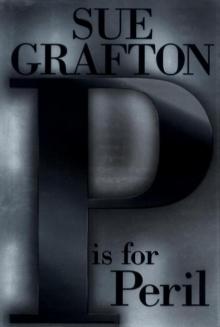 P Is for Peril
P Is for Peril R Is for Ricochet
R Is for Ricochet J Is for Judgment
J Is for Judgment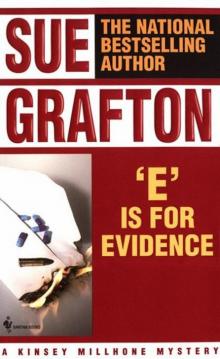 E Is for Evidence
E Is for Evidence T Is for Trespass
T Is for Trespass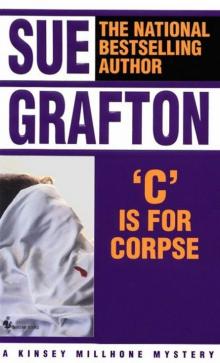 C Is for Corpse
C Is for Corpse U Is for Undertow
U Is for Undertow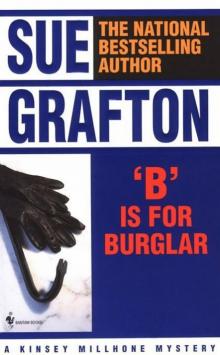 B Is for Burglar
B Is for Burglar Four Sue Grafton Novels
Four Sue Grafton Novels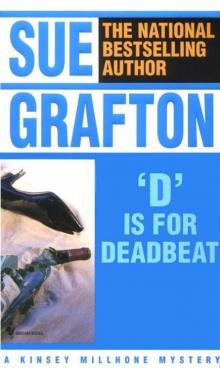 D Is for Deadbeat
D Is for Deadbeat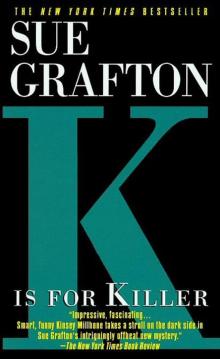 K Is for Killer
K Is for Killer I Is for Innocent
I Is for Innocent A Is for Alibi
A Is for Alibi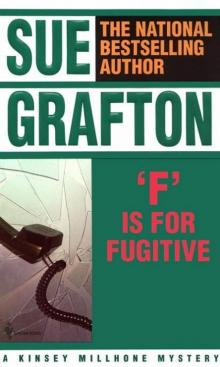 F Is for Fugitive
F Is for Fugitive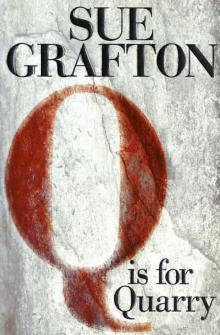 Q Is for Quarry
Q Is for Quarry W Is for Wasted
W Is for Wasted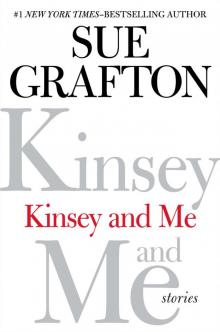 Kinsey and Me: Stories
Kinsey and Me: Stories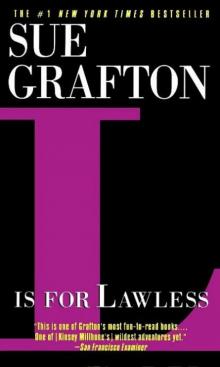 L Is for Lawless
L Is for Lawless Y Is for Yesterday
Y Is for Yesterday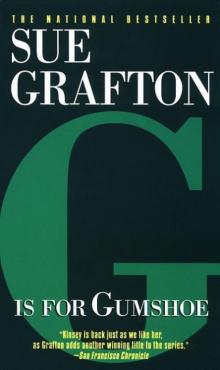 G Is for Gumshoe
G Is for Gumshoe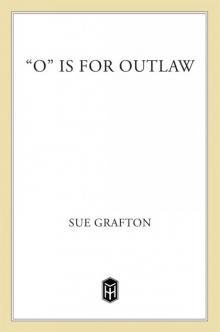 O Is for Outlaw
O Is for Outlaw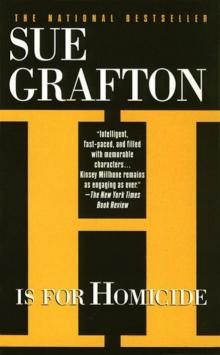 H Is for Homicide
H Is for Homicide X
X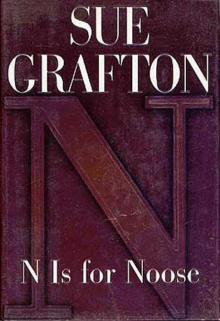 N Is for Noose
N Is for Noose Three Complete Novels: A Is for Alibi / B Is for Burglar / C Is for Corpse
Three Complete Novels: A Is for Alibi / B Is for Burglar / C Is for Corpse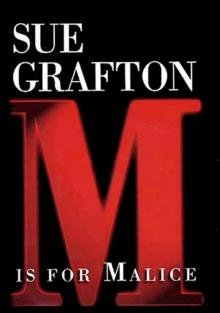 M Is for Malice
M Is for Malice I is for INNOCENT
I is for INNOCENT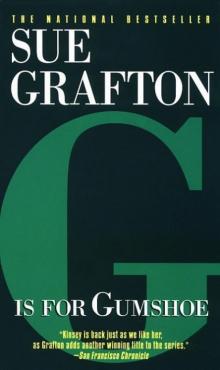 G is for GUMSHOE
G is for GUMSHOE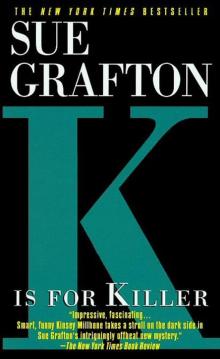 K is for KILLER
K is for KILLER S is for SILENCE
S is for SILENCE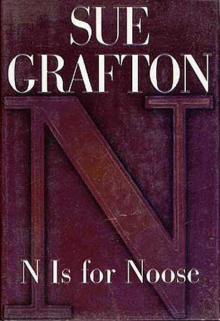 N is for NOOSE
N is for NOOSE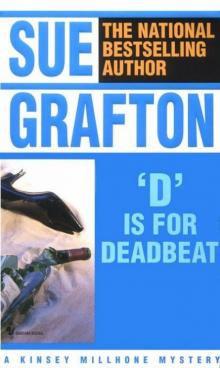 D is for DEADBEAT
D is for DEADBEAT V is for Vengeance
V is for Vengeance U is for Undertow
U is for Undertow W Is for Wasted km-23
W Is for Wasted km-23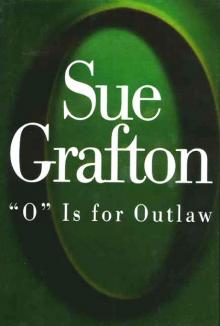 O is for OUTLAW
O is for OUTLAW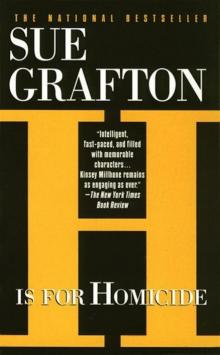 H is for HOMICIDE
H is for HOMICIDE Sue Grafton Novel Collection
Sue Grafton Novel Collection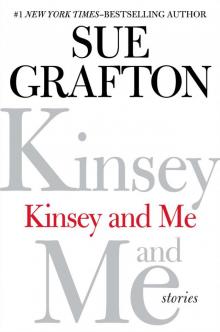 Kinsey and Me
Kinsey and Me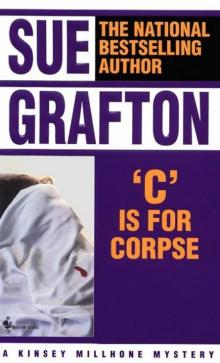 C is for CORPSE
C is for CORPSE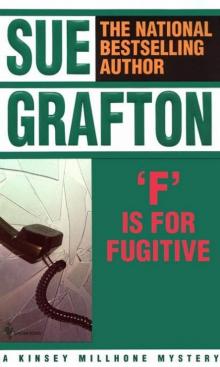 F is for FUGITIVE
F is for FUGITIVE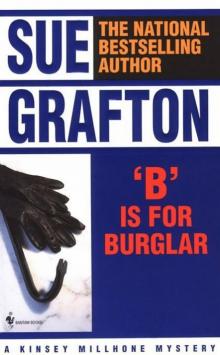 B is for BURGLAR
B is for BURGLAR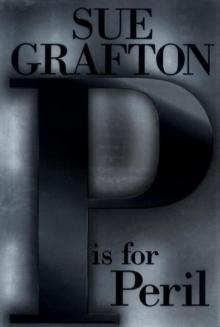 P is for PERIL
P is for PERIL A is for ALIBI
A is for ALIBI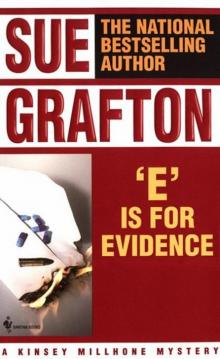 E is for EVIDENCE
E is for EVIDENCE J is for JUDGMENT
J is for JUDGMENT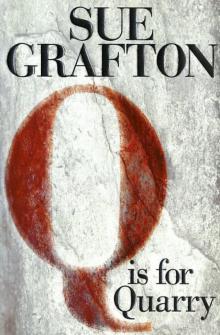 Q is for QUARRY
Q is for QUARRY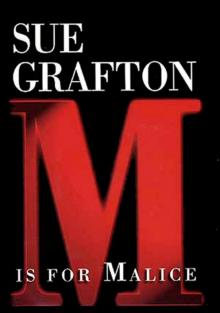 M is for MALICE
M is for MALICE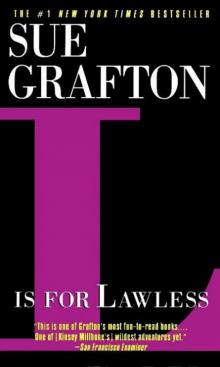 L is for LAWLESS
L is for LAWLESS